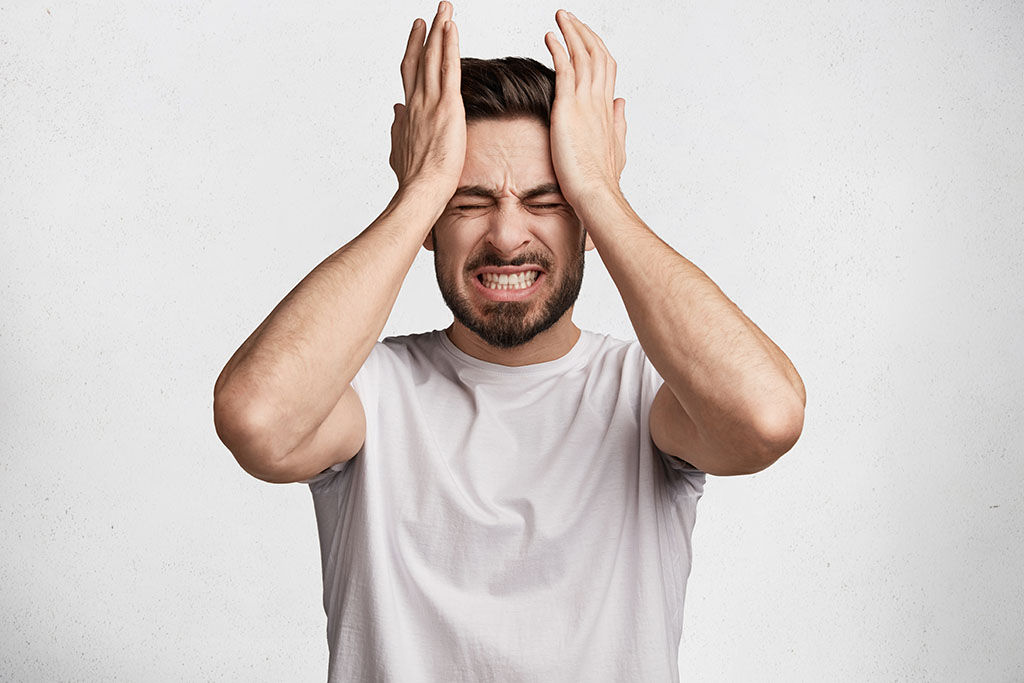
Why do you need tips to stop clenching teeth? Because teeth clenching and jaw tension can sometimes get out of control.
The jaw muscles can start to fatigue and ache, leading to further clenching, headache, and jaw pain. Doctors now know that acute jaw pain, if untreated, is a major risk factor for developing chronic temporomandibular joint (TMJ) disorders. That’s why it’s so important to know some good jaw clenching remedies.
Here are some simple tips on how to stop clenching your teeth.
Teeth clenching is a form of bruxism.
What is bruxism? It is defined as the tonic or phasic activation of the jaw muscles, such that there is repetitive or sustained teeth contact. Tonic activation is where the jaw is stationary and the muscles are constantly tense. Phasic activation is where there is a rhythmic activation of the jaw muscles, like with jaw clenching or teeth grinding. Bruxism can happen during sleep or when you are awake.
Identifying the cause of teeth clenching can be an important clue for getting relief. Here are some common causes of teeth clenching:
Teeth clenching needs to be taken seriously. If muscle fatigue, jaw pain, and tension headaches go untreated, the neurons in the brain become hyperexcitable. Soon even normal sensations from the jaw region can start to register as pain. This is called “central sensitization” and it is a hallmark of chronic TMJ pain disorders.
Now that we’ve reviewed the common causes of teeth clenching, let’s talk about what you can do about it. Here are 5 practical tips to stop clenching teeth.
There are several medications that cause teeth clenching. Here is a list of the most notorious offenders:
Don’t stop taking medications on your own! Instead, alert your health care provider about your teeth clenching symptoms. Often there are alternative medications you can take that will not have the same effect.
As for nicotine and caffeine, you should probably quit those altogether.
Jaw relaxation can be achieved with gentle positional exercises, such as using the “mouth resting position”. This is where the lips gently touch, the teeth are together without force, and the tongue is in the “N” position, just above your front teeth. Just being mindful to stay in the “resting mouth position” can help stop your teeth clenching.
Using a more active application of the “N” position also helps. Here, you want to actively press your tongue on the roof of your mouth. Many people can feel immediate relief from tired jaw muscles when they do this.
For a formal jaw exercise program, consider using Jaw RxErcises. These are a set of exercises that are designed to reduce jaw pain and related symptoms. They are used multiple times throughout the day to help reset the neural pathways in your brain responsible for jaw tension, allowing your jaw and mouth to become re-habituated to the “resting mouth position”.
Thermotherapy is the use of heat to restore health in the body. Heat causes an increase in jaw muscle extensibility and flexibility. This facilitates increased jaw range of motion and provides comfort.
Often, jaw clenching is a guarding reflex in response to pain or fatigue. By using heat to relax the jaw and restore the normal range of motion, the cycle of guarding and clenching can be interrupted”, explains Bradly Eli, DMD, MS, an orofacial pain specialist.
Most of the mouth guards advertised for bruxism are designed to protect the teeth, not to stop clenching. In contrast, anterior bite guards are specifically designed to stop jaw clenching.
Anterior bite mouth guards are custom fit to the front teeth, leaving the back teeth uncovered. This design stops the molars from contacting each other, resulting in jaw clenching relief and immediate comfort. Anterior bite guards (like the QuickSplint®) are sometimes called “anterior deprogrammers” because they act to stop the “programmed” guarding reflex of the jaw.
The neural pathways that are driving the clenching reflex are “deprogrammed” so that the normal harmony between the jaw joint and muscles are restored.
There is a well-established relationship between stress and jaw clenching. There are many simple ways you can de-stress your life. What’s important is that you decide on a couple of methods and be mindful and deliberate about it. Common methods to de-stress include:
You can easily come up with some ideas of your own, just don’t stress out about de-stressing!
If your teeth clenching is causing jaw pain, you need to take it seriously.
We have developed the Speed2Treat Home Healing Kit to be a comprehensive resource for people suffering from jaw pain. It includes the QuickSplint®, a custom anterior bite guard that you can mold and wear on the same day of delivery.
Also included are a neoprene jaw wrap with reusable hot and cold packs, a symptom tracker, physical therapy exercises, and access to pain management videos by world-renowned TMJ pain experts.
Start your journey toward jaw pain relief today with the Speed2Treat® Home Healing Kit!
